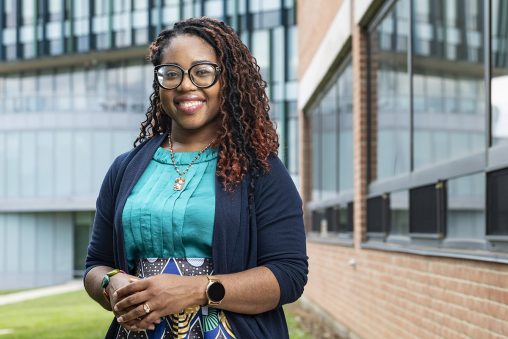
Artesia Dunbar, a clinical psychology doctoral student at Wright State, will train to work with marginalized groups through the American Psychological Association’s Interdisciplinary Minority Fellowship Program.
Ethnic and racial minorities are underserved in the mental health community. Artesia Dunbar, a clinical psychology doctoral student who enrolled in Wright State University to address that issue, recently received help along those lines in the form of a special fellowship.
Dunbar, poised to enter her fourth year in Wright State’s School of Professional Psychology in August, was chosen to participate in the American Psychological Association’s Interdisciplinary Minority Fellowship Program, which has a national, competitive application process.
The fellowship supports the training of ethnic minority graduate students who commit to improving the quality of care provided to ethnic and racial minorities who have a mental or co-occurring mental and substance use disorder. The fellowship also aims to reduce health disparities among ethnic minorities by filling a need for mental health professionals in psychology, among other fields.
That’s exactly what Dunbar aims to do, especially with youth. As a high school psychologist for five years — one in her native Atlanta and the other four in Florida — she has seen the need for such help firsthand.
When she decided to pursue a Doctor of Psychology degree, her search took her to Wright State.
“This is one of the very few programs in the country that had a major focus on diversity and equipping students for work with those who are marginalized,” Dunbar said.
She added that the School of Professional Psychology, which provides generalist training to graduates, also has a track or emphasis that focuses on child and adolescent psychotherapy.
In addition to her experience and her classwork, Dunbar sees the fellowship as providing a boost.
“This fellowship pushes forward the narrative of how we all can work together and improve the quality of mental health care for racial or ethnic minority groups,” she said.
She added that in the field of mental health, “we are progressing as a discipline, but representation in clinicians from racial and ethnically minoritized groups or practitioners invested in serving communities of color is still lacking.”
What the fellowship will provide is “mentorship and training opportunities, the ability to present at conferences, and put together proposals to address the disproportionality and lack of service available to traditionally marginalized communities,” Dunbar said.
Dunbar will attend a new fellowship recipients’ orientation in Atlanta in October and present a project at an interdisciplinary summer institute in Seattle in August 2024.
“I’m hoping that by working with others in this program I’ll learn how to navigate activities like the grant-writing process and ways to maximize effectiveness in private practice or a community mental health setting,” she said. “Further, I’m interested in still working with youth within a school setting in some capacity and learning how to build a web of support for individuals needing more support.”
Dunbar’s long-term goal is to work in a hospital setting to address the mental, social and emotional needs of children who need support. She is particularly interested in more-acute concerns related to psychiatric care and treatment for children of color and their families.
“Historically, the field of psychology hasn’t had a strong relationship with communities of color and there is still a lot of stigma associated with receiving mental health services,” she said. “Breaking down that stigma and have families feel supported is a big part of what I want to do – that would be ideal.”
Michelle Schultz, Psy.D., clinical associate professor and chair of the School of Professional Psychology, speaks highly of Dunbar.
“Artesia is a dedicated, engaged student who exemplifies the mission of SOPP and will be an asset to the fellowship program next year,” Schultz said. “Artesia will be an asset to her future clients and the field of psychology in general.”
Dunbar credited the School of Professional Psychology faculty for supporting her passion.
“So many people have lit a fire in me,” she said. “I’ve always felt that these initiatives were important, and I feel that I have gotten a lot of support around building skills for this work. I do not think I would be so confident in my goals and cultivating my expertise in this area at this point in my training without the individuals who are faculty members in this program.”

 Wright State names Rajneesh Suri dean of Raj Soin College of Business
Wright State names Rajneesh Suri dean of Raj Soin College of Business  ‘Only in New York,’ born at Wright State
‘Only in New York,’ born at Wright State  Wright State president, Horizon League leaders welcome new commissioner
Wright State president, Horizon League leaders welcome new commissioner  Wright State celebrates homecoming with week-long block party
Wright State celebrates homecoming with week-long block party  Wright State baseball to take on Dayton Flyers at Day Air Ballpark April 15
Wright State baseball to take on Dayton Flyers at Day Air Ballpark April 15 